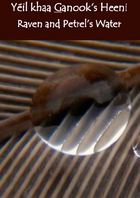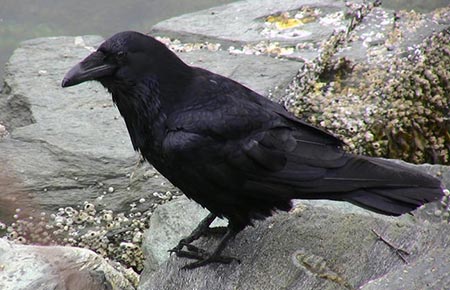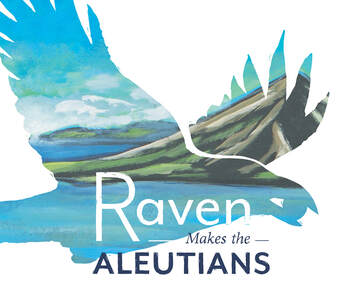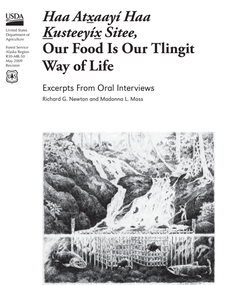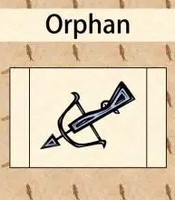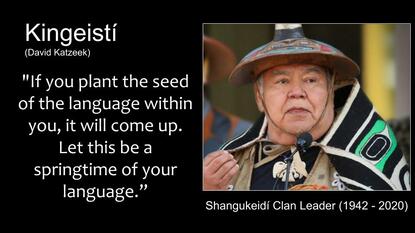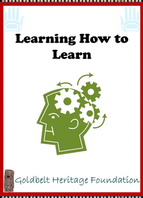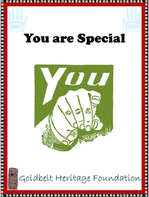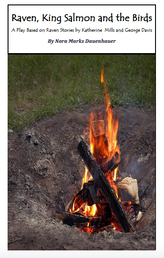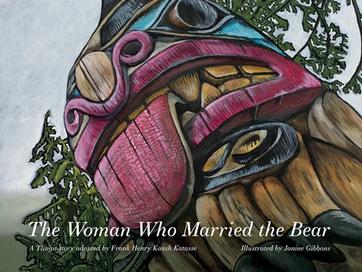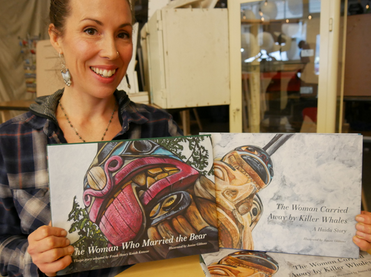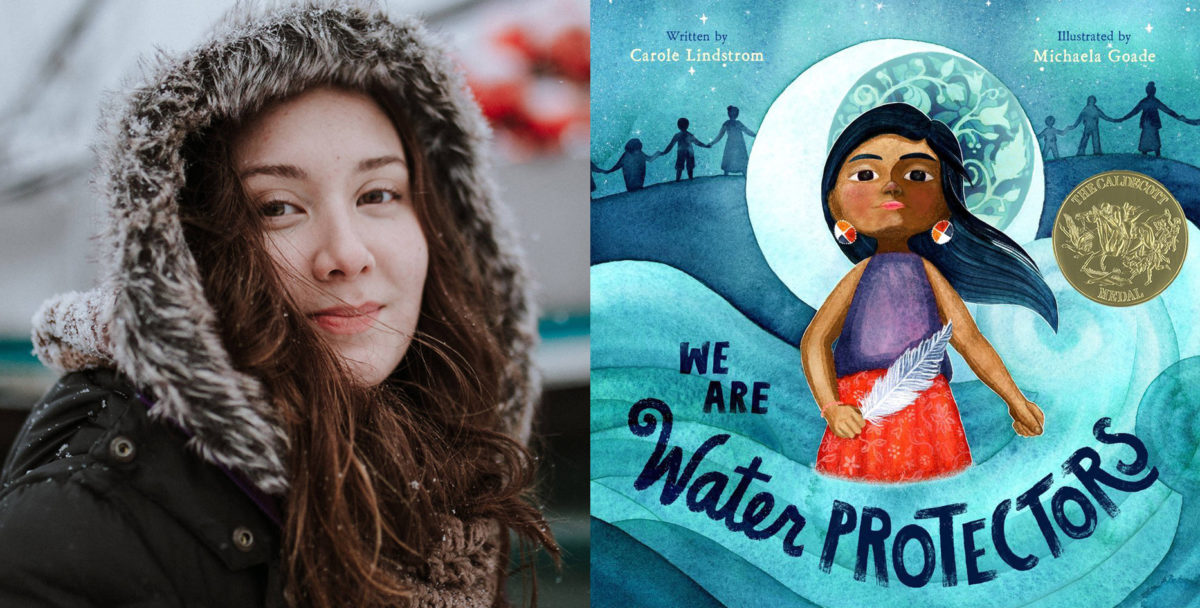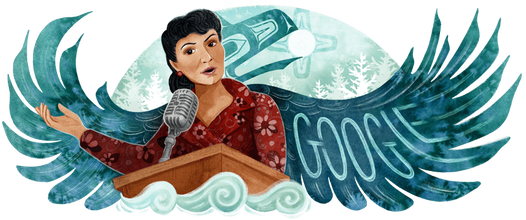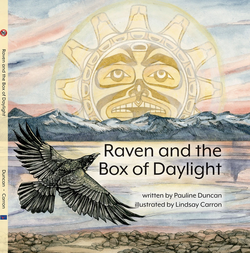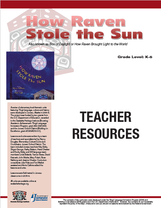Oral Narratives
Culture bearers share oral narratives that connect to the Southeast Alaska tribal values and help teach important lessons. Teachers are encouraged to share these videos with their students as the first hearing of a traditional story. These words of wisdom are meant to be told again and again. The texts provided below act as references for teachers to tell these narratives orally, not read them, to model the traditional way of acquiring and passing on the information of the Lingít people
Week 1: Yéil Ḵa G̱anook Heení (Raven and Petrelʼs Water)
- This story introduces students to the four core values of the Haa Ḵusteeyí Chorus: Haa Aaní (Our Land), Haa Latseení (Our Strength), Haa Shuká (Our Ancestors, Our Future), Wooch Yax̱ (Balance, Harmony).
- Active Listening & Engagement Strategy: As students listen to the retelling of the story, ask students to echo the four core values and enact the gestures when they hear them sprinkled throughout by Jinkasee.ee.
|
Told by Frank Dick, Sr. in Lingít in 1983. Transcribed and Translated by Fred White, November 2012. Adapted for the classroom and published by Goldbelt Heritage Foundation.
|
Retold by Jinkasee.ee (Rose Willard) with the inclusion of the four core tribal values.
|
Haa Ḵusteeyí Chorus sung with gestures by Jinkasee.ee (Rose Willard).
|
Week 2: Why We Tell Stories - Retelling of Yéil Ḵa G̱anook Heení (K-5)
|
Why Do We Tell Stories?
Voices on the Land Project at Floyd Dryden sponsored by Sealaska Heritage Institute |
Stories like Yéil Ḵa G̱anook Heení (Raven and Petrelʼs Water) teach important lessons and traditions, which is why they were retold many times.
|
Weeks 3 & 4: Tlél sh yáa yeeydawóodliḵ (Donʼt All Be in a Hurry)
Raven Makes the Aleutians: After hearing a story told and retold in English and then one read accompanied by illustrations through the Baby Raven Reads program, the 4th week focused on allowing students to hear the beauty of this language by a fluent elder, Kaasgéiy Susie James, students practiced the tribal value of Tlél sh yaa yeedawoodliḵ (donʼt be in a hurry) by sketching a wave pattern that symbolizes the low and high tones of this tribal value or using the sketch by observation cycle from Nancy Lehnhart.
This opportunity to hear Lingít oral narrative allowed students to practice what respectful behavior looks and sounds like when listening to an elder in preparation for next weekʼs visit by Paul Marks, Sr. While listening to Kaasgéiy, students were tasked to listen to the high and low tones of this beautiful language as a review from last weekʼs lesson. Gunalchéesh, X̱ʼunei Lance Twitchell, for collecting and housing these valuable resources. We hope to continue integrating them into our lessons.
This opportunity to hear Lingít oral narrative allowed students to practice what respectful behavior looks and sounds like when listening to an elder in preparation for next weekʼs visit by Paul Marks, Sr. While listening to Kaasgéiy, students were tasked to listen to the high and low tones of this beautiful language as a review from last weekʼs lesson. Gunalchéesh, X̱ʼunei Lance Twitchell, for collecting and housing these valuable resources. We hope to continue integrating them into our lessons.
|
Yéilch Ana.óot Aaní Alyéx̱
Raven Makes the Aleutian Islands Narrator: Kaasgéiy Susie James Recording: late 1960s, Sitka, Ḵaatlʼéix̱ʼ Mary Pelayo Transcription: Ḵeixwnéi Nora Marks Dauenhauer |
Baby Raven Reads Series
adapted by Tlingit writer Pauline Duncan illustrated by Haida artists Janine Gibbons |
Weeks 5 & 6: K’idéin át yisa.áx ka a yáa awuné wáa sá i daa yadukaayí
(Listen well and respect what people say to you)
|
The Orphan and the Six Shirts:
|
Weeks 7 & 8: Sh yáa ayatoodinéi ḵa ldakát káa yáa át ayagaynéi
(Self-Respect and Respect For Everyone)
|
Koohantí: Orphan
by Elizabeth Nyman, Yanyeidí and translated to English by Kingeisti David Katzeek This is a Yanyeidí story about an orphan boy, Koohaantí, as told by Elizabeth Nyman: Yanyeidí, Wolf/Eagle family from the Yukon. It is a story about discipline, obedience and following directions, which every student must absorb in order to learn how to learn. It is a simple, yet powerful story that outlines how grandparents taught their grandchildren; this is a story of love and kindness. |
Week 9: Honoring Kingeistí (David Katzeek): 4 Pillars of Łingít Education
Kingeistí (Shangukeidi clan leader) "walked into the forest" on October 28, 2020. Our entire community has lost an incredible human being whose purpose in life was to "create this legacy of language learners, instructors and teaching our children to be proud of and appreciate the complexity of our culture,” (Rico Worl, 2020). Kingeistí is no longer with us, but his vision for revitalizing the Lingít language lives on.
Kingeistí worked with Goldbelt Heritage Foundation to publish the document below: Shtoo.atgagiltoow (Learning How to Learn), which details an educational system that has helped the Lingít people survive for thousands of years and live in harmony with the earth. It is a system built on four corner-posts based on the foundation of respect. It is a system worth revisiting, honoring and practicing. Sitʼ Eetí Shaanax̱ Glacier Valley honored Kingeisti on November 4th. Ḵinkaduneek Paul Marks (Chookaneidi) shared these four pillars with our students and teachers:
Kingeistíʼs love for children was boundless. He fittingly addressed them as Aan yatxʼu sáani - "precious children of the earth." Our work to revitalize the Lingít language is even more urgent as we lose culture bearers like Kingeistí. He has inspired so many of us to continue this important work. Haa tóo yéi yatee.“It is in us."
Kingeistí worked with Goldbelt Heritage Foundation to publish the document below: Shtoo.atgagiltoow (Learning How to Learn), which details an educational system that has helped the Lingít people survive for thousands of years and live in harmony with the earth. It is a system built on four corner-posts based on the foundation of respect. It is a system worth revisiting, honoring and practicing. Sitʼ Eetí Shaanax̱ Glacier Valley honored Kingeisti on November 4th. Ḵinkaduneek Paul Marks (Chookaneidi) shared these four pillars with our students and teachers:
- Lingít áwé wa.é kaa x’éide kakGees.áax. You are a human being. You are to listen.
- Lingít áwé wa.é yáa kududzigéi. You are a human being. You are Intelligent.
- Lingít áwé wa.é. Yáa at yakGeenéi. You are a human being. You will respect all things.
- Lingít áwé wa.é. Wóoch.een yéi jigaxyinéi. You are a human being. You are to work together.
Kingeistíʼs love for children was boundless. He fittingly addressed them as Aan yatxʼu sáani - "precious children of the earth." Our work to revitalize the Lingít language is even more urgent as we lose culture bearers like Kingeistí. He has inspired so many of us to continue this important work. Haa tóo yéi yatee.“It is in us."
|
Honoring Kingeistí at Sitʼ Eetí Shaanáx̱
|
Sealaska Heritage Institute: Kingeistí Memorial
|
Weeks 10 - 14: Lishoog̱ú át kanaylaneek - Tell Funny Stories
What better way to explore the tribal value of "lishoogú át kanaylaneek" than through Raven the Trickster! Yéil Ḵa Tʼa (Raven and King Salmon) is just such an oral narrative. This oral narrative by Yakwx̱waan Tláa, (Katherine Brown Mills) and George Davis was adapted into a play by Nora Keixwnéi Marks Dauenhauer published by Goldbelt Heritage Foundation. This oral narrative includes many feeling phrases that align with the Tlingit Culture, Language and Literacy 100 Lingít word list, which the Haa Ḵusteeyí project has adapted.
Paul Marks II told this story Week 10, but for Week 11 we will have the students listen to this audio recording of Yéil Ḵa Tʼá by Katherine Mills telling in Lingít while the students draw an event from the story. Gunalchées, X̱ʼunei Lance Twitchell, for housing these precious recordings of fluent speakers on your website. Artist-in-Residency and Storybage: We deepened our engagement with this oral narrative through an artist-in-residency. Ed Littlefield, Roblin, Davis, Abel Ryan and X̱ʼunei Lance Twitchell brought Yéil Ḵa Tʼá to life with their artisty. Please click on the link above to visit several pages dedicated to this project where you can access videos, tutorials and downloadable materials to act out this story at home with family and play games. |
Weeks 15 - 18: Wóoch een kayéilʼ yáx̱ nag̱atee
(Let There Be Peace and Harmony Among Each Other)
The Woman Who Married the Bear, an oral narrative about a woman who insults the bears while berry picking, embodies the tribal values of respect and maintaining peace and harmony among one another. meets a bear in human form. Below is a published adaptation by Tlingit writer Frank Henry Kaash Kataase and illustrations by Haida artist Janine Gibbons, which is available through Sealaska Heritage Instituteʼs Baby Raven Reads series. The Woman Who Married the Bear is also told by Frank Dick, Sr. in the collection of Lingít oral narratives, edited by Nora Marks Dauenhauer and Richard Dauenhauer: Haa Shuká, Our Ancestors (p. 195). Frank Dick, Sr. was born in Sitka on August 20, 1899. He is of the Raven moiety and the Lʼuknax̱.adí clan of Dry Bay. His Tlingit name is Naakal.aan. He is the last living historian of the of Dry Bay and the Diginaa Hit Taan. He can listen to his telling of this story here as you follow along in the text. Gunalchéesh, X̱ʼunei Lance Twitchell for sharing the recording
|
Tlingít Culture with Frank Kaash Katasse
|
Xóots, Xóots, Daasá iyateen? (X, X̱, G, G̱)
To accompany the Woman Who Married the Bear unit, we have adapted Brown Bear, Brown Bear, What Do You See? by Bill Martin, Jr. and Eric Carle to reinforce the land animals listed in the TCLL 100 Lingít Word List and words that contain letters X, X̱, G, G̱ for pronunciation practice. This patterned book asks the question What Do You See? which is one of the first sentence frames in the Beginning Tlingit book by Nora Marks Dauenhauer and Richard Dauenhauer. We simplified the answer to align with this Lingít language book: ________ x̱aatéen (I see a ______).
I have been blessed with incredible Lingít teachers through the University of Alaska Southeast: X̱ʼunei Lance Twitchell and Koolyéik Roby Littlefield. It was in Robyʼs class where I experienced the power of adapting childrenʼs books to teach the Lingít language. Integrating American Sign Language (ASL) into our lessons has been extremely effective. We have cut down the amount of English we use in a lesson significantly with the use of sign language because the hand sign gives enough clues for students to understand what they hear in Lingit. And they are learning two important languages, not one. Gunalchéesh to Janet Olmstead, Deaf and Blind Educator for the Juneau School District, who continues to provide us weekly videos for our Lingít vocabulary and phrases. In the Google Slide presentation, Jinkasee.ee (Rose Willard) provides a short video for each animal. Have fun!
I have been blessed with incredible Lingít teachers through the University of Alaska Southeast: X̱ʼunei Lance Twitchell and Koolyéik Roby Littlefield. It was in Robyʼs class where I experienced the power of adapting childrenʼs books to teach the Lingít language. Integrating American Sign Language (ASL) into our lessons has been extremely effective. We have cut down the amount of English we use in a lesson significantly with the use of sign language because the hand sign gives enough clues for students to understand what they hear in Lingit. And they are learning two important languages, not one. Gunalchéesh to Janet Olmstead, Deaf and Blind Educator for the Juneau School District, who continues to provide us weekly videos for our Lingít vocabulary and phrases. In the Google Slide presentation, Jinkasee.ee (Rose Willard) provides a short video for each animal. Have fun!
|
Xóots, Xóots with English Subtitles
Narrated by Jinkasee.ee (Rose Willard) |
Xóots, Xóots with American Sign Language (ASL)
Signed by Jinkasee.ee (Rose Willard) |
Michaela Goade Receives Caldecott Award for We Are the Water Protectors
|
Michaela Goade, illustrator of We are Water Protectors, was awarded the 2020 Caldecott Medal for the most distinguished American picture book for children. She is the first Native American to receive this honor. Michaela grew up in Juneau and graduated from the Juneau School District. An enrolled member of the Tlingit & Haida Indian Tribes of Alaska, Michaelaʼs Lingít name is Sheit.een. She is of the Kiks.ádi Clan (Raven/Frog) from Sheetʼká (Sitka). Michaelaʼs website has a listing of all of her books, as well as downloadable We Are Water Protectors resources.
|
|
Michaela Goade also illustrated the Google Doodle on December 30, 2020 to commemorate Elizabeth Peratrovich who played an instrumental role in the 1945 passage of the first anti-discrimination law in the United States. According to Google, "On this day in 1941, after encountering an inn door sign that read ʼNo Natives Allowed,ʼ Peratrovich and her husband–both of Alaska’s Indigenous Tlingit tribe–helped plant the seed for the anti-discrimination law when they wrote a letter to Alaska’s governor and gained his support."
|
|
We are Water Protector Read-Aloud
|
Why Michaela Goade Loves Libraries
|
Weeks 19 - 21: Ḵaa wudujeeyí ḵa ḵaa x̱ʼéix̱ dus.aax̱í chʼáagu haa shagóonxʼich ḵusteeyí (Discipline and Obedience to the Traditions of Our Ancestors)
"Told throughout Southeast Alaska, Salmon Boy illustrates significant cultural concepts about salmon – including that they feel and make choices, they attend to human action and communication, that they require respectful treatment, and that they will not return if they are not treated with respect – that are in turn translated into a number of principles on how salmon should be treated" (Sealaska Heritage Institute, 2019). For these reasons, we have selected Shanyaakutlaax̱ as the oral narrative to help illustrate the tribal value of Ḵaa wudujeeyí ḵa ḵaa x̱ʼéix̱ dus.aax̱í chʼáagu haa shagóonxʼich ḵusteeyí (Discipline and obedience to the traditions of our ancestors.)
|
This story is recognized as a Kiks.ádi story. The version presented here is a rewrite of the "Salmon Boy Legend" take from the Juneau Indian Studies Program, 1986. The purpose of this publication is to support Tlingit language immersion programs. This is a much abbreviated version of the actual story. Read the story in its entirety, as told by Deikeenáakʼw in 1904.
|
This version is based mainly on the Kiks.ádi story and features Tlingit narrator Ḵaagwáask’ Ishmael Hope, Kiks.ádi; Tlingit illustrator Sheit.een Michaela Goade, Kiks.ádi; and Tlingit narrative consultants Naakil.aan Hans Chester, L’uknax̱.ádi; Ḵaagwáask’ Ishmael Hope, Kiks.ádi; and Kingesití David Katzeek, Shangukeidí.
|
Weeks 22 - 24: Toowú kaklag̱éi haa tʼaakxʼi, ḵa haa naax̱ sateeyí, ḵa haa kusteeyí
(Pride in our family and our clan and our traditions)
Raven tales are unique to Lingít culture. Although the tales are associated with the Raven moiety most are shared by any Lingit regardless of clan affiliation and make up of the stories told to children. Lily Hope brings Raven and the Box of Daylight to life through her storytelling. A world-renowned Chilkat weaver, Lily is of the Raven T’akdeintaan and is president and co-founder of www.spirituprising.com, a non-profit dedicated to maintaining, recording, and teaching weaving with integrity. There are many Raven stories. If you are interested in another one, here is the story of Raven and the Octopus told by Lingít artist Pattrick Price.
|
Lily Hope Chilkat Weaver
|
Smithsonian Museum of Natural History:
The Artistry of Tlingít Weaving |
Weeks 25 - 26: Dikéexʼ wooch g̱aylasháat
(Hold each other up)
|
Yaandu.ein Paul Marks and Yeeskanaalx Tláa Rochelle Smallwood created a beautiful video telling the story of the Aas Ḵwáan (Tree People), which was shared yesterday at our Haa Ḵusteeyí session to introduce the tribal value of Dikéexʼ wooch g̱ayilsháat (Hold each other up) where students from Riverbend and Sayeik also joined us :) The collaboration between the schools, teachers and Indian Studies program reflects this tribal value on a weekly basis.
|
|
